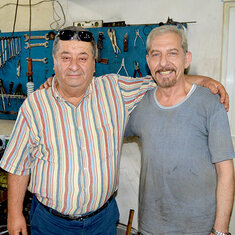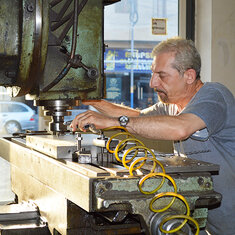Pagecontent
Armenia: New, Old Home
In mid-September, it is still hot in Yerevan. People are strolling along the lively streets of the Armenian capital or enjoying a glass of refreshing fruit punch in bustling pubs. In a dusty side street, Hakob Najaryan pushes the distracting noise to the back of his mind. He needs to stay focused while using the compression machine for grinding works. The door to his workshop is open, the humming sound of the machine can be heard from afar.
Escaping the bombs
Hakob Najaryan is 64 years old. He has been working as a blacksmith for 35 years. It was only recently that he resumed work in Armenia. The wiry man with striking blue eyes is a Syrian of Armenian descent, born and raised in Aleppo. He used to run a successful workshop in the Syrian capital until the war broke out and the daily bombing raids started.
Fearing for his own life and that of his loved ones, Hakob Najaryan fled with his wife and two children to neighboring Armenia, just like 22,000 other Syrian-Armenian refugees did. He also had to leave behind his modern, well-equipped workshop and diligent employees.
The 64-year-old used to be part of the Armenian diaspora community in Syria, which has always remained closely connected with its ancestral homeland. "I felt as if I had come home," Hakob Najaryan recalls the day he arrived in Yerevan and wipes off the sweat from his forehead.
Back to the start
He has been living in Armenia for four years now. Knowing how to speak Armenian helped him to start all over. Nevertheless, getting used to his new, old home was anything but easy in the beginning.
Together with Hakob Galajian and his nephew Karapet Galayji, the skilled machinist wished to settle down in Yerevan. In a common effort and by investing all their savings, they could barely afford to rent a small workshop. "We are used to working hard, but we did not have any tools or machines," Hakob Najaryan explains.
Facing the future with courage
The European Union did not hesitate to respond with the EU Madad Fund to those and other needs of Syrian refugees. It aims to provide aid to displaced Syrians and their host communities. Austria is one of the donors and, so far, has contributed 13.5 million euros. The funds are managed by the Austrian Red Cross in Armenia.
The newcomers reaped the benefits of the international support: They could afford to buy the urgently needed equipment, that is, the compression machine, a drill, an electric screwdriver and two grinders, which are essential requirements to earn a modest income.
Does he want to return to Syria when peace is restored? Hakob Najaryan shakes his head. "I'm not going back. Armenia is my mother country. I want to build a new life here. "


